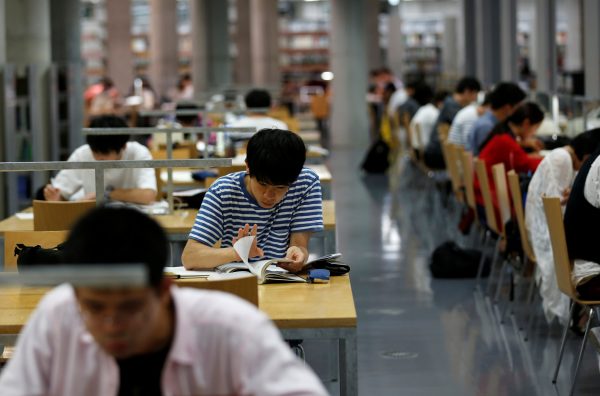In late 2016, a government watchdog body discovered the case of a retiring ministry official landing a job at Waseda University, arranged by an intermediary who was also an ex-official. Damning evidence emerged that the ministry attempted to conceal its involvement by distributing answers to anticipated questions so that everyone involved could coordinate a story of denial.
Amakudari is officially banned in Japan. Breaking the law is serious enough, but the ministry’s attempt to conceal its transgressions and the disclosure that this practice was widespread has ignited public outrage and transformed this into a significant political scandal.
Japan’s Prime Minister Shinzo Abe is trying to manage the crisis by commissioning a government-wide investigation and promising to act on the findings. But it is improbable that this is only a problem in the Ministry of Education. Other ministries have been reprimanded previously for similar actions.
The cascade of revelations forced the resignation of the vice-minister for education, the ministry’s most senior bureaucrat, in a ritualistic gesture of taking responsibility and atonement. But as the probe continues, pressures are building for a wider housecleaning that could involve political repercussions regarding this dubious practice.
Who knew that this ethically compromised practice continued, hidden in plain sight? For universities, this practice was viewed as a cost of doing business and it was no secret to anyone paying attention.
In 2007, the Diet revised the National Public Service Law to prohibit serving bureaucrats from lobbying for post-retirement sinecures for their colleagues. This reform was enacted because there was a perception that amakudari was standard operating procedure and a hotbed for unethical practices.
Banning amakudari targets the potential conflict of interest for officials planning on securing a job at an organisation that they supervised in the course of their duties. In some cases, this may lead to regulatory capture in which regulators decide in favour of the regulated in the hope of a job offer down the road. Or the supervised entities might seek favourable treatment or access to privileged information that confer an advantage over rivals. There is an assumption that organisations that play ball by hiring their former government supervisors will benefit from doing so while those that refuse will suffer.
There have been numerous scandals involving amakudari and many attempts to ban it, but none have been successful. At its most benign, the practice is justified as a means of ensuring better communication between government and the private sector by creating networks of information sharing. But numerous scandals over the years make it look more like influence peddling and a bureaucratic shakedown.
So why has this practice persisted for so long despite being banned and periodically censured?
The largest loophole, as Chalmers Johnson quipped, is lax enforcement. Officials are charged with ensuring compliance within their own ministries and agencies, but it’s hard to deny your colleagues what they consider their due. As prospects for further promotions dwindle, senior bureaucrats are eased out with the promise of a post-retirement job.
In the current scandal, it is clear that the ministry sought to circumvent the legal ban on amakudari. They relied on a former bureaucrat, retired since 2009, to act as an ad hoc matchmaker between universities and the ministry’s personnel department. The existing amakudari provision barred current officials from engaging in the practice.
From 2013 this became more systematic as an entity linked to the ministry provided this ex-employee with an office and secretary to conduct his job placement activities. Lists of retiring bureaucrats were provided and the ex-official facilitated their employment at universities.
It was hard for universities to refuse these arrangements given how dependent universities are on the discretionary budgetary powers of ministry officials. Research funds, establishment of new departments, subsidies, numbers of students and more are all subject to ministry approval.
A final report by the government-wide probe will be released towards the end of March 2017. The political opposition will seize on this issue to discredit the Abe government and increase pressure on the administration to tackle, yet again, this widespread scourge.
It remains uncertain if this scandal will undermine public support for Abe, but one can reliably predict that the practice will persist and further improprieties will be exposed. Forget about eradicating amakudari because it is deeply entrenched and benefits powerful vested interests in Japan.
Jeff Kingston is Director of Asian Studies at Temple University Japan. You can follow him on Twitter at @JBKing33.


All one has to do to see that concerns about amakudari have been long-standing as well as not effectively remedied is to follow the links provided by Professor Kingston: one of them is a piece written in 2009 about the DPJ’s efforts to deal with it when it was in power. Here we are 8 years later and the practice is still alive and well!
Will Abe really do something about it? Or will he, like his predecessors, prove unable/unwilling to confront the powerful and long-standing social and economic dynamics that fuel this practice? When/how will the Japanese electorate do something about it? Is there an ‘outsider’ politician who can gather enough votes to force a change? Not likely in a system that is based on such a good old boys network, I am afraid.